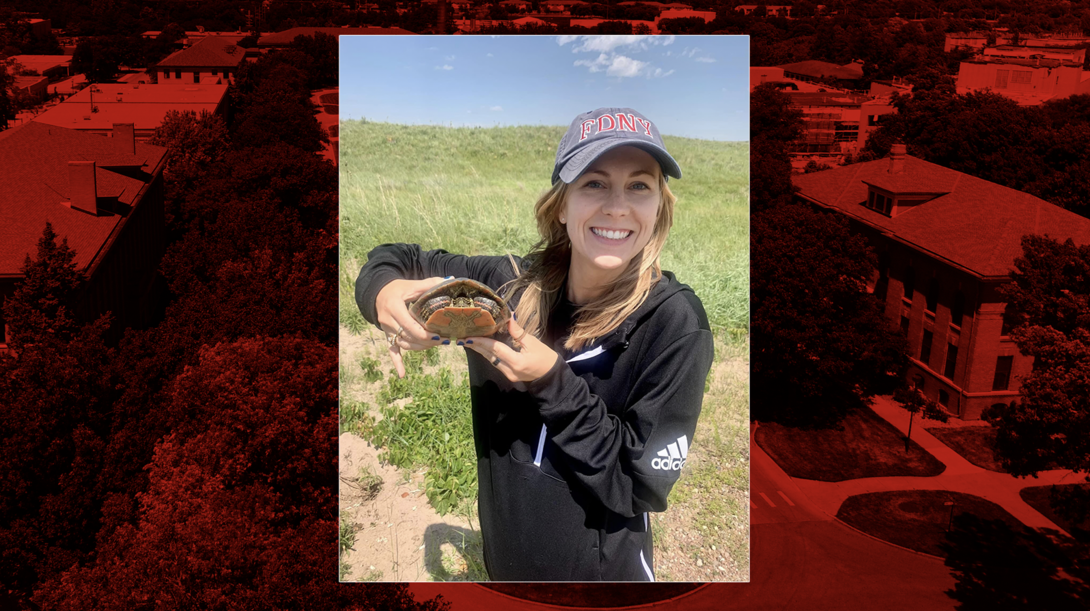
Lincoln, Neb. —Four years ago, Alexa Davis was a natural resources student defending her master’s degree with spotty Internet service and seeking a job during Covid lockdown. Today, she works with the director and deputy director of the Nebraska Department of Natural Resources as a data analyst who speaks to groups across the state about water management, law and policy.
She took home the Early Career Excellence Alumni Award at the School of Natural Resources Spring Banquet on April 6. On May 16, she co-hosted Governor Jim Pillen on a work podcast, “Around the Water Cooler with NeDNR.”
This type of work and accolades was not what the Omaha native said she expected to have while working on her undergraduate degrees at Nebraska in environmental restoration science and water science.
“One of the main drivers of wanting to go into environmental science is that I did not want to talk to people,” she said. “I just wanted to be out in nature and do science and not have to worry about politics or hurting anybody's feelings. And, slowly, throughout being in school and then being in my career, I've just really embraced my love for my job and what I do.”
At Nebraska, she joined clubs, took internships and volunteered, landing an environmental specialist job at NeDNR about a month after graduating with her master’s in natural resources. About a year and a half after that, the heads of the department asked her if she wanted to work in educational outreach with them as a data analyst.
“I always like to tell people that I was too extroverted for the technical team,” she said with a laugh.
In her current position, she manages and analyzes data on the supply and demand of water across the state but also does outreach, co-hosts the department’s podcast with Dehvynne Ashmore and, along with Kent Zimmerman, is in charge at NeDNR of the Resilient Soils and Water Quality Act and the Nitrogen Reduction Incentive Program. She said she also works on the website, sets meetings for others, moves desks around and does whatever she can to help.
“It really was kind of a 180° of what I originally thought that I was going to do, but it's a good 180°,” she said.
She has grown into the position, and although she still gets nervous about speaking in public, she said she is always the first person to volunteer for it. She talks herself out of nervousness, she said, by using tricks like telling herself, “These are good nerves, like I’m excited,” and practicing the Wonder Woman pose (hands on hips and face tilted determinedly) before going on. She will try to make the audience more comfortable by telling jokes like, “If you have any questions, just yell, ‘Hey, Alexa!’ and we’ll see how many Alexas are around the room.”
Her transition into a spokesperson role has been weird but necessary, she said, noting the need for STEM professionals to be open to change and to evolve with the workplace.
“I think a lot of the times when you talk about good scientists or good engineers, you can do an amazing job at doing what you do, but if you can't talk to people about it, then it kind of dies there,” she said.
She loves her job now and wants to stay at NeDNR for her career, she said. She even told her boss, the deputy director, she would like to one day have his position, and he has been helping prepare her for it, she said.
“That's my end-career goal, but, yeah, I say that now, but I do know that life changes and my curiosity will maybe develop in something else,” she said.
She just finished a class, Introduction to Ecological Engineering, this spring and said she plans to be a lifelong learner. Looking back, she said she wished she had taken more computer programming and coding classes to have a baseline of technical skills in working with new technologies like artificial intelligence and drones.
She advised students to try out possible careers through club activities, internships, jobs and job shadowing.
What she said was her main advice for students, though, was to not be afraid to ask for help or talk to people. She said she raised her hand in class when she didn’t understand something and reached out to professors and to Sara Winn, student success coordinator, for guidance on classes and career options.
Davis offered to talk with students needing guidance on career options and resources, stating many people at the university helped and mentored her and she wanted to pay that forward.
“I would not be in my position today and I would not love my job today if it wouldn't have been for the School of Natural Resources,” she said. “Going and getting my degrees there has been one of the best things that I’ve ever done.”







